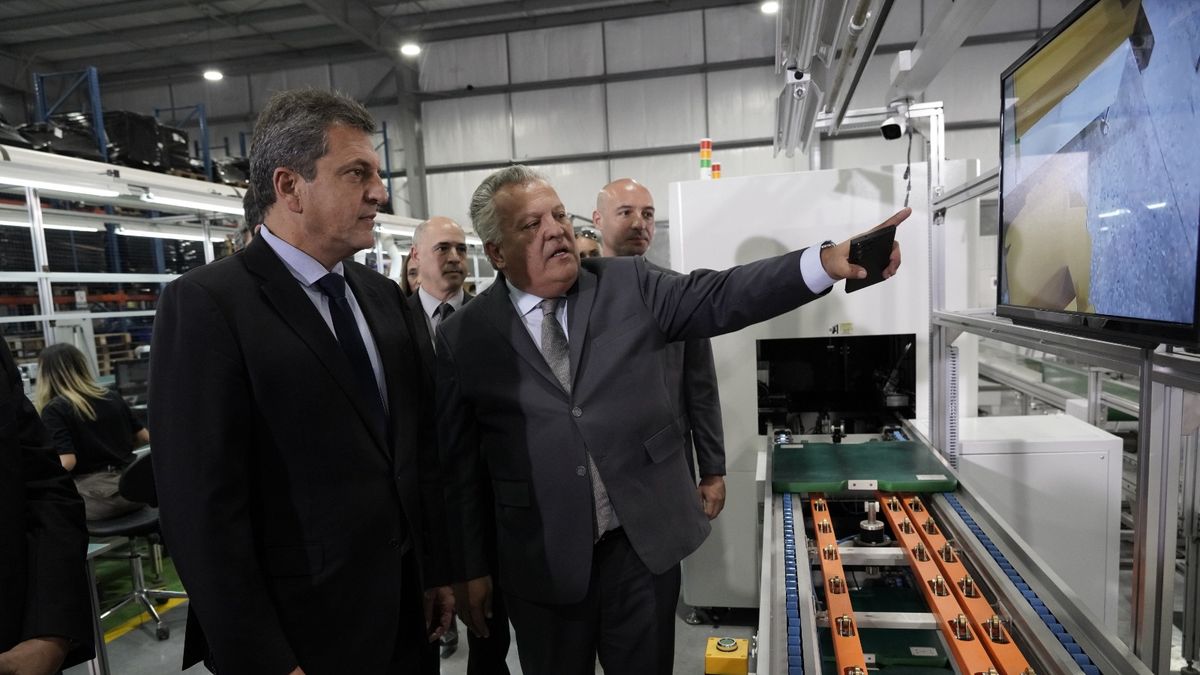The Minister of Economy, Sergio Massainaugurated this Monday a new plant of the Argentine company pixart, which will manufacture notebooks in partnership with Google to export to Latin America. In addition, in an agreement with Qualcomm and Intel they will seek to advance in the local production of chips and take advantage of the context of the trade war between the United States and China. At the moment There are 6 companies that produce computers locally, and they aim to reach 16. After the increase in tariffs, the sector assures that it can produce at “competitive” prices, but adds that investments and technology must be added.
During the inauguration ceremony of the new Pixart plant, located in the Escobar district of Buenos Aires, Massa stated: “It is a source of pride to see that our country can produce and export using state-of-the-art technology, entering industry 4.0having a development centrally mounted on robotics”.
In dialogue with Ámbito, Gabriel Ortiz, founder and CEO, said that he made an investment of more than $20 millionbecause the plant has 4.0 technology, with smart cameras and 36 robotswho participate in the entire process that is automated.
In fact, at the employment level, there are 10 engineers who manage the plant from a control tower. “There will be another 10 people at the plant to support the production lines. What we are going to end up taking the most are some 100 programmers for the models of the applications for the processes”, recounted Ortiz.
The newest thing about the plant is not the production of educational Chromebooks in an alliance with Google, but the search they will do to manufacture components. “We have 2 computer production lines that allow us to assemble the entire machine. And we are going to start the first tests of chips and motherboards, first with simple processes, to be able to design and print in a laboratory, and once we learn, to be able to think in scale, it is a path that must be followed”, he explained. The agreements with Intel and Qualcomm are for technology transfer.
Ortiz’s motivation, but also that of multinationals, is linked to what is happening worldwide with the trade war between the United States and China. “To make chips you would need a giant plant, but today the risks are atomized by the possibility of an invasion or relations between countries being broken, and the whole world running out of components. The United States seeks to be able to manufacture on scale outside of China. That is why our idea is to force Latin America to have a portion of the manufacturing business.Ortiz opined.
When asked by this newspaper whether it is competitive to enter this sector, Ortiz replied that in relation to the computers with Google, of the 300,000 that he already has ordered, 200,000 are for export to Latin America. Regarding electronic components, he opined that “the gold in the world today is chips”, and due to geopolitics “you cannot depend on a single producing country”, so they are going to decide what type to specialize in, either on computers, cell phones, washing machines or televisions.
In the same line, Ariel Sujarchuk, Secretary of Knowledge Economy, assured Ámbito that there is a trend of geographical decentralization of industries, but also a geopolitical question. “The contracts with which Pixart signed are all companies inoculated in the United States, but there does not have to be an exclusivity. For Argentina, if it manages to be a chip manufacturer, it enters another category.
This is the first plant to open its doors after the increase in computer fees, from 0 to 16%. carlos scimone, manager of the multimedia and communications chamber (Camoca), assured this newspaper that there are 6 companies that currently manufacture computers, such as BGH, Grupo Núcleo, Novatech, Newsan and Exo, which generate some 1,300 jobs. According to a survey of the chamber, they could reach 16, but this year he estimates that they will exceed 10, due to others that will be added to assemble. “Some have to get in tune with investments to be more efficient, have state-of-the-art technology, and thus be able to export”revealed.
In addition, he anticipated that together with 6 business chambers they will present a bill to expand the electronics industry, to have tax benefits to encourage the sector.
The tariff debate
Regarding the price increases surveyed by private computer consultancies after the rise in tariffs, sujarchuk He opined that they were “unjustified”. “Traders import at a dollar of $200 and sell at one of $380, the increase is speculative,” she opined. Escobar’s former mayor promised that local production will lower the prices of notebooks from $200,000 to $150,000.
When asked about how much the increase in the tariff on computers influenced the inauguration of the plant, Ortiz replied that he had been working since 2020. In the event that in a semester the government changes and brings tariffs back to 0%, such as promised by the former president Mauricio MacriOrtiz opined: “It should not work that way, but I am not going to close even if that happens.”
Ámbito consulted what would happen to all the assemblers if a change of government occurs and tariffs return to 0%, as happened in 2017: “It is the million dollar question,” said Scimone. “We will have to see, because there is a division between the PRO and the radicals, it would be good if they come to meet the companies to see if they change their minds,” he concluded.
Source: Ambito




